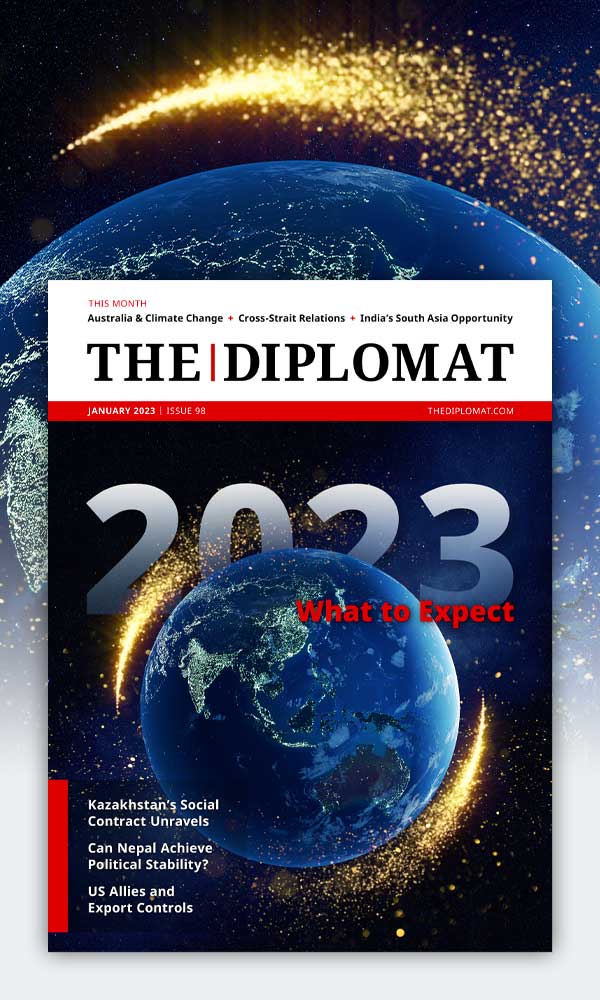| Welcome to the latest issue of Diplomat Brief. This week our top story explores the state of LGBTQ rights in China through the lens of a high-profile anti-discrimination case. We also have an interview with Kirsten Han, a journalist and activist, about the movement to abolish Singapore’s death penalty. |
| Story of the week |  | Society What a Gay Flight Attendant’s Lost Discrimination Case Says About LGBTQ Rights in ChinaWhat Happened: In October 2019, Chai Cheng, a flight attendant for China Southern Airlines, became the center of a social media frenzy when security camera footage showing him kissing another man leaked online. Chai, who had kept his sexual orientation hidden at work, was placed on leave; six months after that, he was fired. Chai filed suit against China Southern, claiming discrimination. Among other evidence, Chai had a recording of his supervisor calling him “abnormal” and out of step with “socialist core values.” Our Focus: Chai’s case highlights three interconnected problems facing China’s LGBTQ community, outlined by Darius Longarino and Yanhui Peng for The Diplomat. First, there is a “deep fear of discrimination” that prevents the vast majority of LGBTQ Chinese – surveys suggest up to 95 percent – from being out in the workplace. Those fears are compounded by the fact that there are no laws specifically prohibiting discrimination based on sexual orientation or gender identity. “As such, few LGBTQ workers have made it to court after being unfairly fired, and even fewer have convinced courts that they were discriminated against,” Longarino and Peng write. In other words, Chai’s court loss is the norm, not the exception. Finally, China’s government continues to tacitly legitimize discrimination through “policies that include ‘homosexuality’ in lists of banned content and define same-sex relations as a violation of public morals.” What Comes Next: LGBTQ rights in China have always been precarious, but things could get worse before they get better. “LGBTQ groups are being cut off from funding, reporting on LGBTQ-related news is increasingly restricted, and policies such as banning ‘sissy men’ in entertainment are sending strong signals about which kinds of citizens are ‘normal’ and deserving of respect,” Longarino and Peng note. “The resulting chill is likely to leave LGBTQ people even more vulnerable to discrimination and with even less access to remedies.” Read this story |
| Behind the News | INTERVIEW Kirsten HanKirsten Han, a journalist and pro-abolition activist, on the Singaporean government’s response to public criticism: “The reaction of the state to anti-death penalty activists highlights that they don’t see critics or activists as legitimate stakeholders and voices in the debate. When it comes to this issue, there is very little good faith engagement.” Read the interview |
| This Week in Asia | Northeast Asia Japan’s Annual Diet Session Begins, With Focus on DefenseJapan’s Diet opened this year’s session on January 23. Among the key policy and legislative agenda items, funding the Kishida government’s proposed increase in Japan’s defense budget is one of the most critical decisions to be made. Figuring out where the money will come from – a tax hike, government bonds, or another option – is crucial to Kishida’s political survival. Find out more | South Asia With India’s Help, Sri Lanka Gets Closer to IMF FundingLate last week, India’s external affairs minister announced from Colombo that New Delhi had offered financing assurances to the IMF to help clear the way for a bailout package for Sri Lanka. Shortly after, China – the biggest state lender to Sri Lanka – offered its own support for the deal, including a debt suspension for two years. Getting creditors to agree to restructure Sri Lanka’s massive debt burden is a condition of the badly needed IMF package, which is now one step closer to realization. Find out more | Southeast Asia New Universal Jurisdiction Case Filed Against Myanmar JuntaThe human rights group Fortify Rights this week filed a criminal complaint in the German legal system, requesting that it investigate Myanmar’s military leadership for genocide, war crimes, and crimes against humanity. The complaint, which was made on behalf of 16 plaintiffs from Myanmar, is the latest that seeks to use the doctrine of “universal jurisdiction” to bring the country’s generals to justice. While its success is uncertain, the accumulation of international legal cases could make life difficult for Senior General Min Aung Hlaing and his cronies. Find out more | Central Asia Tashkent Mayor Dismissed as Energy Woes PersistLast week the powerful and presidentially appointed mayor of Tashkent, Jahongir Artikhodjaev, found himself among a bevy of officials dismissed as frigid temperatures lay bare the ongoing energy crisis in Uzbekistan. Artikhodjaev has survived numerous scandals since his 2018 appointment, from allegations of corruption, conflicts of interest, and cruel evictions in conjunction with the Tashkent City development project. But the energy crisis in Uzbekistan proved too serious for his close relations with President Mirziyoyev to sustain him as mayor, though he maintains other positions in city government. Find out more |
| Visualizing APAC |  | Bangladesh has seen continuous growth in the Human Development Index since 1991, but inequality remains a looming issue. See the full picture |
| Word of the Week | Politics अखण्ड भारतAkhand Bharat, literally “unified India” in Hindi, is a rallying cry by Hindu nationalists who claim that Afghanistan, Pakistan, Tibet, Sri Lanka, Bangladesh, and Myanmar are rightfully part of a Greater India. Find out more |
|  |



